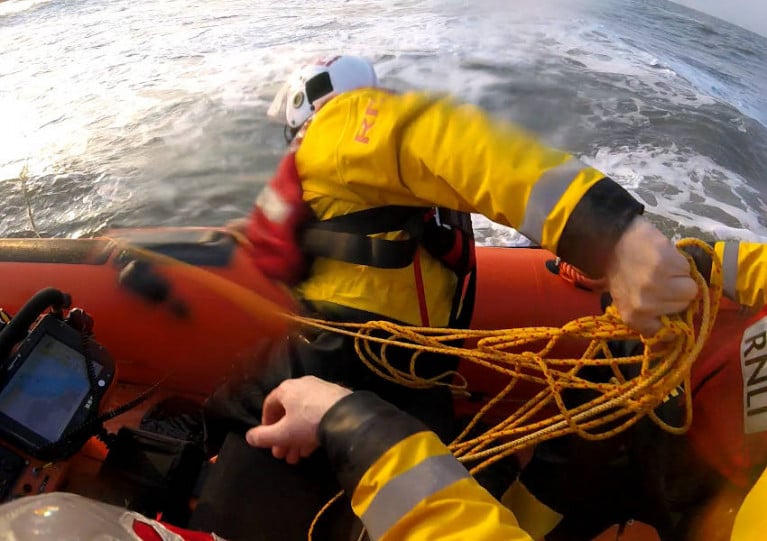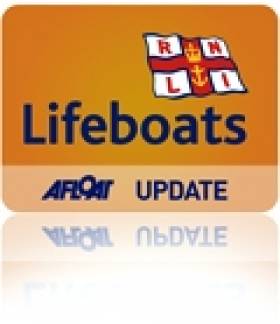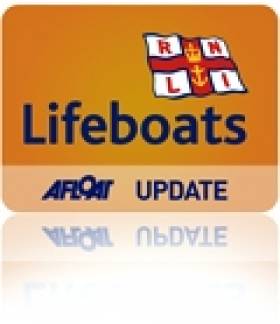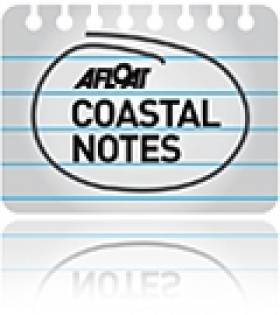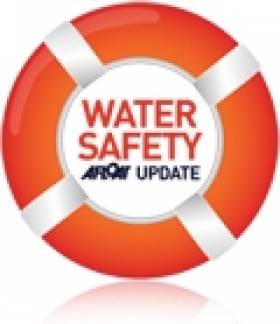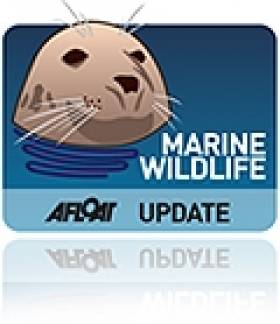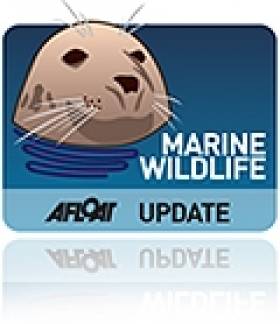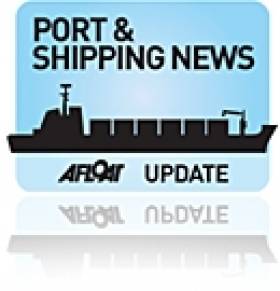Displaying items by tag: Balbriggan
Skerries RNLI were tasked on Thursday evening (18 August) following 999 calls to Dublin Coast Guard reporting a mother and child on a paddleboard being blown out to sea near Balbriggan.
The north Co Dublin lifeboat’s volunteer crew launched within minutes of pagers sounding shortly after 8pm, headed for a position one mile north of Bremore Point in Balbriggan some 200 metres off shore.
Conditions at the time had a Force 5 westerly wind with a moderately choppy sea.
Arriving on scene, the volunteer crew quickly spotted the casualties and moved the lifeboat alongside them. Having confirmed that they were unable to make their way back to the beach, both mother and child were taken on board the lifeboat, along with their paddleboard.
The crew carried out a quick first aid assessment and decided that the best course of action would be to bring them back to the warmth of the lifeboat station for further observation.
Once ashore in the boathouse, they were checked over by a local GP, who also happened to be one of the crew on board the lifeboat.
The mother and child did not require any further medical assistance and were soon able to leave the station safe and well when a family member arrived to collect them.
Speaking about the callout, volunteer lifeboat press officer Gerry Canning said: “We have responded to a number of paddleboard instances off Balbriggan this summer with offshore breezes making it difficult if not impossible to get back to the beach.
“Thankfully in this case they did the right thing in staying on the board and waiting for help to arrive.
“Remember, if you see someone in difficulty on or near the water, dial 999 or 112 and ask for the coastguard.”
Skerries RNLI’s volunteers launched their inshore lifeboat on Wednesday evening (21 April) as part of a multi-agency response to reports of a swimmer in difficulty near the Martello tower in Balbriggan.
The Atlantic 85 lifeboat Louis Simson was launched within minutes of the crew being paged just before 7pm and proceeded directly to the area indicated.
On arrival the crew found the Dublin-based Irish Coast Guard helicopter Rescue 116 already on scene and winching a man from the water.
The casualty was the lowered onto the beach and into the care of an ambulance crew and members of Dublin Fire Brigade who administered first aid before he was transferred to hospital.
Meanwhile, further reports came in that other swimmers had entered the water to assist the casualty and a subsequent emergency call raised concerns that there may still be someone in the water.
Rescue 116, Skerries RNLI and the Skerries Coast Guard unit coordinated to carry out a search of the immediate area covering the water and the shoreline.
The lifeboat investigated a number of objects at the request of Rescue 116, including a lifebuoy which they recovered into the lifeboat.
When Dublin Coast Guard was satisfied that the area had been thoroughly searched and there were no further swimmers in danger, the lifeboat was stood down and returned to station.
Speaking about the callout, press officer Gerry Canning said: “When a person is in trouble in the water, every second counts. Rescue 116 were on scene very quickly and it was an excellent response from all of the emergency services who worked brilliantly together.
“Our thoughts are with the friends and family of the man taken from the water and we hope he makes a full recovery.”
Skerries RNLI Launches To Flare Sighting Off Balbriggan
#RNLI - Skerries RNLI carried out a search of an area north of Balbriggan on Wednesday night (14 August) after a vessel in the area reported sighting a distress flare.
The volunteer crew launched their inshore lifeboat shortly after 9.30pm with Philip Ferguson as helm and crew members Adam Scott, Stephen Crowley and AJ Hughes on board.
Dublin Coast Guard requested the lifeboat to launch to investigate a report of a distress flare north of Balbriggan Harbour in North Co Dublin.
The lifeboat proceeded directly to the area indicated by the coastguard and conducted an extensive search. Clogherhead RNLI were also tasked and carried out a search further north, while the Skerries Coast Guard unit carried out a search of the coastline in the area.
Just after 10.30pm, the Dublin Coast Guard declared that they were satisfied that a thorough search had been carried out, and with nothing found all units were stood down to return to base.
Speaking after the call-out, Philip Ferguson said: "Conditions were very good on scene and while it was quite a dark night, visibility was reasonably good which helped our search.
"Our volunteer crew are always ready to launch to any sign that somebody is in difficulty at sea and we are happy that on this occasion no lives were in danger."
Skerries RNLI Aids Stranded Powerboat
#RNLI - Skerries RNLI went to the assistance of two people whose powerboat got into difficulty off the Balbriggan coast in north Co Dublin yesterday.
Shortly after 6pm last night (Tuesday 19 February) the station’s volunteer lifeboat crew was requested to launch after the alarm was raised by gardaí that a 4-metre speed boat was in difficulty just off Hampton Cove in Balbriggan.
The boat, which was approximately three miles out from Skerries, had fouled its propeller.
Weather conditions at the time were described as cold and dusk was settling into dark.
The Skerries RNLI crew put to sea accompanied in the air by the Irish Coast Guard helicopter, which had been on exercise locally.
Arriving on scene, it became apparent that the two people on board had managed to paddle their boat safely to the shoreline. The Skerries lifeboat crew proceeded to tow the speedboat back safely to Balbriggan Harbour.
Balbriggan Beach Reopens After E.coli Scare
#COASTAL NOTES - The Irish Times reports that Balbriggan Beach was reopened for swimming yesterday 31 August after the latest in a string of E.coli scares around the Irish coast.
The beach at the north Co Dublin coastal town was closed to bathers after a pumping station malfunction caused raw sewage to be pumped into the sea for up to 24 hours earlier this week.
E.coli levels were subsequently recorded at five times the maximum EU safety limit, and as much as 100 times the Blue Flag standard for European beaches.
The incident raised concerns among campaigners opposed to the proposed new water treatment 'super plant' for Fingal.
As previously reported on Afloat.ie, worries have been expressed by locals in the towns of Skerries, Loughskinny and Rush about the effects of the planned outfall pipe in their area.
The Balbriggan swimming ban marked the second beach closure in north Dublin during August, after the waters at Rush South were found to be contaminated with E.coli over the bank holiday weekend.
A bathing ban was also imposed on seven beaches in Cork last month due to high levels of the bacteria, while a breach of safe levels at Salthill in Galway last week caused concern ahead of tomorrow's Ironman 70.3 triathlon.
This Friday Last Day for 2012 Fingal Lifeguard Applicants
#WATER SAFETY - This coming Friday 30 March is the closing date for applications for Fingal County Council beach lifeguards for the 2012 summer season.
Lifeguard cover will be provided on Fingal beaches on weekdays and weekends 11am to 7pm from 2 July till the last week of August, depending on weather and staff levels.
Beaches and bathing places scheduled to be guarded this summer include Balbriggan (front beach), Skerries South, Loughskinny, Rush North and South Shores, Portrane (Tower Bay and The Brook), Donabate, Malahide, Portmarnock, Sutton (Burrow Road) and Howth (Claremount).
Applicants must be not less than 17 years of age on 1 May 2012. Application forms are available to download HERE.
Balbriggan to Host Maritime Artefacts Exhibition
#MARITIME EXHIBITION – The Loughshinny & Rush Historical Society is to host a maritime exhibition of artefacts next Thursday (9th February) at the Bracken Court Hotel, Balbriggan, Co. Dublin.
Many items trawled in the locality of the fishing harbour will be displayed to draw attention to the maritime heritage of the area with a view to assessing interest in a local maritime museum.
School trips have been organised during the day and the exhibition will remain open until 21.00.
For further information contact John Daly Tel: 8105059 or Mob: 086 2603738
Bottlenose Dolphin Pod Seen Again Off Dublin Coast
#MARINE WILDLIFE - They were thought to have disappeared from the east coast in October after delighting wildlife enthusiasts in Dublin and Wicklow.
But concerns that one of the group had died were swept side when the pod of three bottlenose dolphins was once again spotted off Killiney recently.
The Wicklow People reports that the two adults and one juvenile reappeared almost two weeks ago, and have been seen daily "putting on great displays of leaping, breaching, and tail slapping".
Fears were that tragedy had befallen the group when two bottlenoses were seen off Skerries and Balbriggan in late October, and a juvenile was found dead in Portmarnock shortly after.
As previously reported on Afloat.ie, some 200 sightings of the dolphins between Dalkey Island and Wicklow town in recent months were validated by the Irish Whale and Dolphin Group (IWDG).
According to the IWDG, evidence suggests that the pod is now resident off the east coast.
The Wicklow People has more on the story HERE.
Seriously Ill Seal Pup Now In Recovery
#MARINE WILDLIFE - A harbour seal pup found in a serious condition in Balbriggan last week is new recovering in the care of the Irish Seal Sanctuary.
Colin, as he has been named by ISS volunteers, was discovered on Kings Beach suffering from blood loss and breathing problems, the Fingal Independent reports.
An ISS spokesperson remarked that it was "very unusual" to find harbour seal pups this late in the year, and in an area dominated by colonies of grey seals.
Thanks to medicine donated by the Dogs Aid veterinary clinic in north Dublin, Colin is now "making great progress" though full recovery will take some time.
The seal pup will remain in the care of the ISS until he is fit enough to be returned to Balbriggan for release.
Bremore Survey Indicates New Push for Port Development
Drogheda Port Company is seeking tenders to carry out geological investigations off Bremore Head near Balbriggan, the Sunday Business Post reports.
The port company and partner Treasury Holdings had been working with Hong Kong-based Hutchison Whampoa on plans for a new port in the north Co Dublin area, set to have a starting freight capacity of 10 million tons per year.
Treasury Holdings says the survey is intended to help avoid developing on a location that could interfere with historic sites, after An Taisce voiced its opposition to any port scheme that would impact on an archaeologial site running from Bremore to the mouth of the River Delvin.
An Taisce is also opposed to another proposed site at Gormanston.
Drogheda Port Company CEO Paul Fleming could not be contacted by the Sunday Business Post to comment on whether the tender indicates a decision to move forward with plans for a port at Bremore.
Minister for Transport Leo Varadkar said he supported the bid to develop a new facility at Bremore, after a previous move to extend the boundaries of Drogheda port were halted by legislative limits that have since been amended.
The Sunday Business Post has more on the story HERE.



























